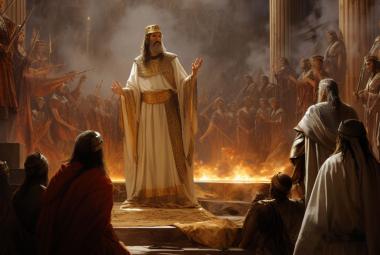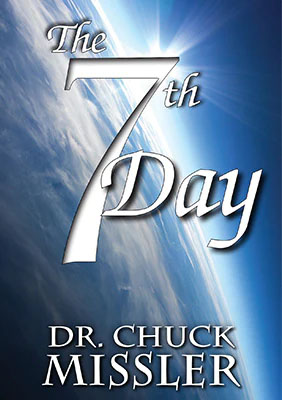Last month we explored the origin of the Sabbath Day and its observance in the Old Testament and the period of the Gospels. As Christians, however, we venerate the first day of the week in honor of the Resurrection of our Lord Jesus Christ and tend to regard that as equivalent - in some respects, at least - to "remembering the Sabbath Day to keep it holy."1 However, for many there is still a discomfort with the ostensible substitution of the clearly established Seventh Day as God's expressed instruction.
While many contend that the basis of Sunday worship is suggested in some of the passages in the New Testament, it is not as clearly taught as we might hope. The practices of the early church, however, do seem rather well documented.
The Sabbath in the Early Church
Ignatius, the disciple of the Apostle John and the Bishop of Antioch, wrote to the Magnesians in the early years of the second century:
Be not deceived with strange doctrines, nor with old fables. For if we still live according to the Jewish law, we acknowledge that we have not received grace;
And then he goes on to categorize his readers as:
...those who were brought up in the ancient order of things but who have come to the possession of a new hope, no longer observing the Sabbath.2
Justin Martyr, the first great Christian apologist around the middle of the second century, explains in his Dialogue with Trypho why the Christians do not keep the law of Moses, submit to circumcision, or observe the Sabbath. He asserts that
- True Sabbath observance under the new covenant is the keeping of a perpetual Sabbath, which consists of turning from sin;
- The righteous men of old, Adam, Abel, Enoch, Noah, and the like, pleased God without keeping the Sabbath;
[Prove it! They probably did .]
- God imposed the Sabbath upon Israelites because of unrighteousness and hardness of heart.3
This appears a bit specious, however. There is clear evidence that the redemption through blood atonement,4 the concept of "clean" vs. "unclean,"5 as well as the Sabbath 6 were ordained as early as the Garden of Eden, and then later codified under the Mosaic law. God didn't "impose" the Sabbath on Israel "because of unrighteousness and hardness of heart"; it was in observance in Exodus 16, four chapters before Exodus 20. Justin Martyr's myopic perspective is disturbing.
Irenaeus, the Bishop of Lyons during the latter part of the second century, viewed the Sabbath as symbolic of the future kingdom of God, "in which the man who shall have persevered in serving God shall, in a state of rest, partake of God's table."7 He cites Abraham as one who believed God "without circumcision and without observance of Sabbaths." While his assumptions about Abraham appear presumptuous, his "typological" view is consistent with Hebrews 4.
Clement of Alexandria, writing in The Stromata around the close of the second century, says "The Sabbath, by abstinence from evil, seems to indicate self-restraint."8 [I would hope that our self-restraint from evil would not be limited to one day in seven!]
Tertullian, at the beginning of the third century, said, "We have nothing to do with Sabbaths or the other Jewish festivals, much less with those of the heathen."9 He was destined for disappointment as Sunday, as a pagan festival, was later legislated.
In another work he says that those who would contend for the continued obligation of Sabbath-keeping and circumcision must show that Adam, Abel, Noah, Enoch, Melchizedek and Lot also observed these things. [In view of Genesis 2:1-3 and Exodus 16, I personally would be very surprised if they didn't!] His view of circumcision, and the law in general, is in accord with the council at Jerusalem in Acts 15 and Paul's clear teaching. 10
He goes on to say that the Sabbath was a figure of rest from sin and typical of man's final rest in God. It, together with the other ceremonial regulations of the law, was only intended to last until a new Lawgiver should arise who should introduce the realities of which these were but shadows. 11 And this is, indeed, consistent with the teachings of Hebrews.12
While later writers came to think of Sunday as bearing an analogy to the Hebrew Sabbath, and others called the Christian holy day a Sabbath, 13 they grounded its observance more on the authority of the Church than on the teaching of any text.
Sunday Legislation
In the course of Constantine's wars with his rivals to establish himself on the throne, on October 27, 312 A.D., on the eve of the battle of Milvain Bridge just outside of Rome, he is reported to have seen in the sky a vision of the cross with the words: "In this Sign Conquer."
He had painted on his men's shields a figure that was, perhaps, intended to be Christ's monogram (although he may have had Christ confused with the Sun in his manifestation as Summa Divinitas ["the highest divinity"]. He won the battle and declared himself a Christian, establishing a turning point in the history of Christianity.14
Whether this was a true conversion or a politically advantageous rationalization is a matter of scholastic dispute. 15 Like his father, he had originally been a votary of the Sun and had gone to worship at the Grand Temple of the Sun in the Vosges Mountains in Gaul, where he had his first vision - a pagan one.
This may well have been simply a pragmatic attempt to unify the empire. He was faced with a diverse population following numerous forms of pagan sun worship. The Syrian solar cults of Sol Invictus (the unconquerable sun) and Jupiter Dolichenus had played an important role under previous rulers. The Persian cult of the ancient Iranian god of light, Mithra, had also spread throughout the empire. There developed a syncretism that tended toward a "solar monotheism" to fuse into a single supreme god all of the pagan divinities, especially the solar gods Sol, Helios, Sarapis, and Mithra .
[This was the same type of pagan pragmatism that Mohammed later exploited in syncretizing the 360 idols of Ka'aba into the worship of Al-Ilah in Islam.]
And another key demographic factor was emerging: by the end of the Imperial Persecutions (313 A.D.), Christians, then an illegal sect, numbered about half of the population of the Roman Empire. The embracing of this growing underground movement could simply have been an extremely clever stratagem for consolidating power.16
Emperor Constantine served from 306 - 337 A.D. He ultimately abolished slavery, gladiatorial fights, the killing of unwelcome children, and crucifixion as a form of execution. Frustrated with the paganism clung to by the aristocracy in Rome, he relocated the capital of the world to Byzantium, renaming it the "New Rome," Constantinople (now Istanbul).
This, too, may have been motivated by its strategic and economic importance, with its proximity to the Danube and Euphrates frontiers and the straits of Bosphorus and the eastern commercial routes.
The Edict of Toleration, 313 A.D : By this edict, Constantine granted to "Christians and to all others full liberty of following that religion which each may choose." This was the first edict of its kind in history. (This has been superseded in America by Darwinism and the God of Chance, a paganism which is now enforced in schools and public places.)
On March 7, 321, Constantine introduced the first civil legislation concerning Sunday: "Let all the judges and town people, and the occupation of all trades rest on the venerable day of the sun."17 In 325 A.D., Constantine issued a general exhortation to all his subjects to embrace Christianity. He ordered 50 Bibles to be prepared under the direction of Eusebius, on the finest vellum and by skillful artists. 18
In his zeal to institute a universal creed, he presided over the Council of Nicaea in 325. He personally was not actually baptized until his deathbed in 337.
It was a later successor, Emperor Theodosius (347-395 A.D.), who made Christianity the state religion of the Roman Empire. His legislation in 380 affirmed the dogmas of the Council of Nicaea and made church membership compulsory (the worst calamity that has ever befallen the church).
Theodosius undertook the forcible suppression of all other religions, and in 392 he prohibited paganism.19 Thus began the great apostasy as the church began its pursuit of temporal power. 20 (It was through this fusing of extant paganism with the new Christianity that the December 25 of Sol Invictus became the Christmas of the Christians, etc.)
If our perceptions of Revelation 13, 17, and 18 are correct, the current "Ecumenical Movement" will ultimately lead to a reprise of global ecclesiastical tyranny and the Darkest Ages of all...and another "Holocaust" to come. 21 Hegel was right: "History teaches that man learns nothing from history."
There remain a number of views regarding the replacement of the Seventh Day with the first day of the week:
The "Christian Sabbath" View
This view holds that Sunday is the Christian Sabbath, the observance of which is a moral obligation based on the 4th commandment of the Decalogue. This view emphasizes the divine institution of the Sabbath at the close of creation. God's blessing and sanctification of the seventh day is taken to mean that He intended one day in seven to be observed by all men in all ages as a sacred day of rest and worship.
It is regarded as a moral command of universal and perpetual obligation. It is held that Jesus affirmed that He was "lord even of the Sabbath"22 and therefore had the authority to change the day of its observance. It is usually held that this change took place during the 40 days between Christ's resurrection and ascension when He spoke to them concerning the kingdom of God (Acts 1:3).
Sabbatarianism is the doctrine of those Christians who believe that Sunday is the Christian Sabbath, to be observed in accordance with the 4th commandment. In its strictest form, it was the creation of the Scottish and English Reformers, especially John Knox. The Scottish Presbyterians and the Puritans brought their views to the colonies, where rigorous "blue laws" were enacted.
Sabbatarians insist that Jesus intended to perpetuate the Sabbath and extend its application to all men. Much stress is placed on His statement, "The Sabbath was made for man, not man for the Sabbath," as evidence that Jesus regarded the Sabbath as an institution which is grounded in the very constitution of man, and which was instituted by God from the very beginning not only for Israel but for the whole human race. The teachings of Paul regarding the Sabbath are taken to refer only to the Jewish Sabbath and not to the "Christian Sabbath."
The Bible does teach that God instituted the Sabbath at the close of Creation, and the Sabbath is identified as "the seventh day," not as one day in seven.23 There is both a moral element and a ceremonial element in the 4th commandment. The moral element provides for the worship of God. The ceremonial elements is viewed as applying only to the Israelites. Jesus Himself treated the Sabbath law as ceremonial when He defended His disciples for plucking grain on the Sabbath. A moral law could never be suspended by circumstances of hunger or by the requirements of merely ceremonial regulation. Paul made no distinction between ceremonial and moral laws when he declared that all external law is abrogated for the Christian.24
The basic weakness of this theory is the teaching that a change was made in the day of the week to be observed as the Sabbath. There is not the slightest hint in the New Testament that Jesus transferred the Sabbath to another day of the week.
If one insists on the perpetual and universal obligation of the 4th commandment, and at the same time recognizes that there is no New Testament ground for a change in the day of its observance, the only logical position to which one is forced to maintain is that the seventh day of the week, and not the first day, should be observed as the Sabbath, as the 4th commandment stipulates.
The Seventh-Day Sabbath View
[Christians who believe that the Sabbath should still be observed on Saturday are also sometimes called Sabbatarians.] This view, held by the Seventh-Day Baptists who originated in England in the 17th century, and by Seventh-Day Adventists who originated in America in the 19th century, insists that the Christians are obligated to keep the seventh day of the week as the Sabbath.
They regard the Ten Commandments as "the Law of God," to be distinguished from the ceremonial laws, which are called "the law of Moses." 25 They find evidence for the observance of the seventh day in the New Testament. They appeal to the practice of Jesus and the apostles attending the synagogue on the Sabbath. 26
They apply Jesus' prophecy regarding the future flight from Jerusalem and His exhortation that they should pray that their flight should "not be on the Sabbath day."27 (They seem to ignore the possibility that this event might be post-rapture and refers to "those who are in Judea.")
They also contend that the reference in Revelation to "being in the Spirit on the Lord's day" is a reference to the seventh-day Sabbath. 28 (This author, however, believes that this is actually a reference to the "Day of the Lord" as portrayed by Joel, et al. The aorist tense in the Greek would seem to support the uniqueness of John's experience.)
Actual "evidence" of Sunday worship is circumstantial, and describes actions of observant Jews. The distinctions advanced by the Sabbatarians have no direct Biblical evidence or attendant instruction. And as for compulsory ritualistic commitments, Paul definitely included the Sabbath command among those ordinances which were done away with in Christ.
The evidence from the early church leaders is clear that they did not regard Sunday as a continuation of the Hebrew Sabbath.
The Dangers of Legalism
Many of us have encountered the zeal of the Seventh-Day Adventists over the "Seventh Day" issue, and there are many of their observations incorporated in this material. However, it is not the Seventh Day issue which emerges as theologically predominant: it is the role of the Law, and our liberty in Christ that is the paramount fundamental issue.
The clear and emphatic teachings in the Epistles to the Galatians, Colossians, and Romans far overshadow any particular cultural customs, and underscores our freedom from external rules as the key instruction in entire New Testament. That, indeed, is the "Good News."
Conclusions
Can we enjoy the benefits of the Sabbath without "coming under the law?"
As we mentioned last month, it seems clear that Adam, Cain, Enoch, Noah, et al, all had instruction on the seventh day of rest. It was still the pattern in Exodus 16 before the manna was given. It was memorialized in the Decalogue. And it was observed by Christ ceremonially. (We adopt other Jewish practices to our benefit without incurring the burdens of the law: circumcision, some of the dietary practices, etc.)
The Sabbath was not only a memorial to celebrate His Creation. It is also a type, or foreshadowing, of His Rest, the ultimate climax of His Redemption.29 Can we enter into His Rest literally as well as figuratively?
This article was excerpted from our Briefing Pack, The Seventh Day.
Notes:
- Exodus 20:8-11.
- The Ante-Nicene Fathers, Vol I, pp.62, 63.
- The Ante-Nicene Fathers, Vol i, pp.199, 200, 204, 207.
- Genesis 3:21 vs. 3:7.
- Genesis 7:2ff.
- Genesis 2:1-3.
- Against Heresies, Book IV, Chapter 16, The Ante-Nicene Fathers, Vol I, p.481.
- The Stromata, Book VII, Chapter 12, The Ante-Nicene Fathers, Vol II, p.545.
- On Idolatry, Chap. 14, The Ante-Nicene Fathers, Vol III, p.70.
- Colossians 2:16, 17, Romans 14:5, et al.
- An Answer to the Jews, Chap. 2, The Ante-Nicene Fathers, Vol III, pp.153, 155, 156.
- Hebrews 4:1-11.
- Eusebius, Commentary on the Ninety-first Psalm, quoted by J. A. Hessey, Sunday, pp.299, 300; Alcuin, Homily 18, post Pentecost, quoted by A. E. J. Rawlinson, The World's Question and the Christian's Answer, p.78; P. Alphonsus quoted by Hessey, Sunday, p. 903; all quoted in Zondervan' Pictorial Encyclopedia of the Bible.
- EB, Vol 20, 353-4.
- His contemporaries, Lactantius and Eusebius of Caesarea are not enlightening and even contradictory on the subject. EB, Vol 20, p.353.
- EB, Vol 20, p.349, 355.
- Corpus Juris Civilis Cod., lib. 3, tit. 12, Lex. 3, given in Latin and in English in Philip Schaff's History of the Christian Church, Vol. 3, 3d period, chapter 7, sec. 75, p.380, fn 1. Also in Albert Henry Newman's A Manual of Church History, rev. ed., The American Baptist Publication Society, Philadelphia PA, 1933, Vol 1, pp.305-307; and in Leroy E. Froom, The Prophetic Faith of Our Fathers, Review and Herald Publishing Assoc., Washington DC, Vol 1., pp.376-381.
- We generally fail to appreciate the costliness of such an undertaking in the absence of modern printing. See How We Got Our Bible.
- Encyclopedia Britannica, Vol 18, p.926.
- For a shocking summary of the history of the church - of which every Christian needs to be aware - see our Briefing Package, The Kingdom of Blood.
- Zechariah 13:8; Jeremiah 30:7, "the time of Jacob's trouble," indeed.
- Mark 2:27, 28.
- Genesis 2:3; Exodus 16:29; 20:10; Deuteronomy 5:14.
- Colossians 2:10-16.
- A. L. Baker, Belief and Work of Seventh-Day Adventists, p.74.
- Luke 4:16; Acts 13:14, 42; 16:13; 17:1, 2; 18:4.
- Matthew 24:20.
- Revelation 1:10.
- Hebrews 4:1-11.







